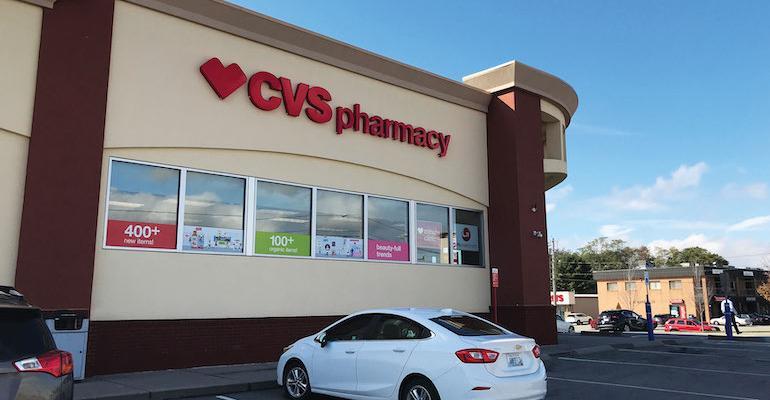CVS Health aims to shut about 900 CVS Pharmacy drugstores over the next three years under a strategic plan to sharpen its focus on omnichannel health care.
With the move to shrink its retail footprint, CVS said Thursday that it plans to shift the retail business to a dual-leadership structure and has created the new role of chief pharmacy officer to oversee the omnichannel initiative.
Plans call for Woonsocket, R.I.-based CVS to close roughly 300 stores annually over the next three years as the company looks to scale back store density in certain areas. The approximately 900 locations slated for closure would account for about 11% of CVS’ total of 8,115 retail stores as of the end of 2020. Its network through last year also included 1,845 pharmacies inside other retailers’ stores, including over 1,700 Target stores and nearly 100 Schnuck Markets supermarkets.
With retail touchpoints in all 50 states, the District of Columbia and Puerto Rico, CVS also currently operates about 1,100 MinuteClinic walk-in primary care clinics, including in-store locations, plus retail pharmacy websites, long-term care (LTC) pharmacies and on-site pharmacies. In 2020, the company dispensed more than 27% of total U.S. retail pharmacy prescriptions.
CVS noted that the store downsizing reflects changes in population, consumer buying patterns and evolving health needs, and the company wants to ensure it “has the right kinds of stores in the right locations for consumers and for the business.”
To that end, CVS said it aims to develop new store formats to serve as community health destinations and boost engagement with consumers. Three store models include sites focused on primary care services; an enhanced version of HealthHUB locations with products and services for everyday health and wellness needs; and traditional CVS Pharmacy stores providing full prescription drug care along with health, wellness, personal care and other convenience-focused retail offerings.
The store changes are slated to begin in spring 2022. Impacted employees will be offered roles in other locations or other opportunities as part of CVS’ overall workforce strategy, the company said. In connection with the planned store closures, CVS expects to record an impairment charge of $1 billion and $1.2 billion in the 2021 fourth quarter.
“Our retail stores are fundamental to our strategy and who we are as a company,” CVS Health President and CEO Karen Lynch said in a statement. “We remain focused on the competitive advantage provided by our presence in thousands of communities across the country, which complements our rapidly expanding digital presence.”

Also on Thursday, CVS announced the promotion of Prem Shah (left), executive vice president of specialty pharmacy and product innovation, to the new post of chief pharmacy officer.
Shah, with CVS since 2013, will lead the omnichannel health transformation as well as serve as co-president of the CVS retail/LTC business segment. Joining Shah as co-president of the retail/LTC arm will be Michelle Peluso (below), who is being promoted after coming to the company earlier this year as executive VP and chief customer officer. She will oversee front-end retail strategy and operations.

CVS said Shah and Lynch are scheduled to start in their new positions on Jan. 1. Both will report to Lynch.
“Prem and Michelle are ideally suited for their new roles and will be instrumental to CVS Health as we continue to execute against our strategy of delivering an integrated health care experience centered around the consumer,” according to Lynch.

With the strategic changes, CVS announced the upcoming departure of Neela Montgomery (left), executive VP and president of CVS Retail/Pharmacy. Plans call for Montgomery, who has served in her current post since the end of November 2020, to remain in that role until the end of 2021. She joined CVS as head of its retail business after most recently serving as CEO of Crate & Barrel.
“We appreciate Neela’s contributions during an incredibly challenging and dynamic period when our retail stores played a critical role in the country’s fight against COVID-19,” Lynch commented. “We value the leadership she has provided during a time of evolution in our business and wish her continued success.”
CVS’s omnichannel health strategy reflects current changes in the health care arena focusing on wider consumer access, including the growth of urgent care facilities, telehealth services, online prescription services, and tie-ins at retail stores between food, vitamins/supplements and other products and services to promote overall wellness.
During the past 15 years or so, CVS also has evolved from a regional drug chain and value retailer to one of the nation’s biggest health care companies and the largest U.S. pharmacy care provider. The transformation included the acquisitions of retail health provider MinuteClinic in 2006 and long-term care pharmacy Omnicare in 2015, plus a couple of ground-breaking mergers. In March 2007, CVS finalized its $26.5 billion acquisition of Caremark Rx, which joined a retail pharmacy chain and a pharmacy benefit manager under one company. That deal marked the beginning of CVS’ transition from a pharmacy retailer into a broad health care services company, which culminated in November 2018 with the closing of the company’s $70 billion merger with health insurer Aetna. CVS adopted the name CVS Health in 2014 after announcing plans to remove tobacco products from all stores. The company’s workforce of about 300,000 employees now includes more than 40,000 physicians, pharmacists, nurses and nurse practitioners.
CVS Health came in at No. 7 in sales ($91.2 billion) and No. 5 in stores (9,960 locations) on the Supermarket News 2021 Top 50 Retailers list. CVS' rankings reflected its retail pharmacy/LTC segment only for fiscal 2020, ended Dec. 31, 2020. Retail front-end sales were $19.66 billion and pharmacy sales were $70.18 billion. Overall CVS Health revenue for fiscal 2020 (also including pharmacy services, health care benefits and corporate/other business segments) totaled $268.71 billion.





